|
 Secure Site
Secure Site
|
 |
Archive for April, 2012
 Woodblock print by Toyohara Chikanobu (1838-1912), dated 1896;Once you experience the Zen Timepiece's progressive tones, you'll never want to meditate any other way. Meditation offers a number of benefits, but did you know it can also improve ALL, yes ALL of your relationships, whether romantic or purely business? Try this meditation tip to reduce relationship stress.
The below is reprinted with permission from The Best Meditations on the Planet by Martin Hart (Fair Winds Press, 2012)
Disputes with the people we know often arise from the judgments we’ve made about them. When we point fingers and judge other people to be wrong, we experience frustration, disappointment, anger, anxiety, or other unpleasant emotions We also set up an “us vs. them” situation. Our reactions generate stress and unhappiness in our relationships.
The following practice helps you become aware of the judgments you make every day. By paying attention to how you judge others, you can reduce the stress you experience when relating to other people and ease tensions with family members, partners, and coworkers.
- Notice each time you make a verbal or mental judgment about someone else. That idiot pulled right out in front of me! That woman is so fat, how can she let herself get that way? He’s stupid to believe that crazy idea…
- Notice each time you use these words: should, must, ought to, got to, have to, need to.
- Just observe what you say and think. Each time you catch yourself judging or criticizing someone, simple acknowledge it by mentally saying “judgment”.
- Don’t judge or blame yourself for having judgmental thoughts.
- In time, you’ll discover that you aren’t as quick to find fault with others. Your desire to change them lessens You can observe the people in your life without criticizing them or judging them to be wrong.
- You’ll also find that your own stress level diminishes, as does the tension between you and other people.
- Make this practice a part of your everyday life.
adapted from healinglifestyles.com
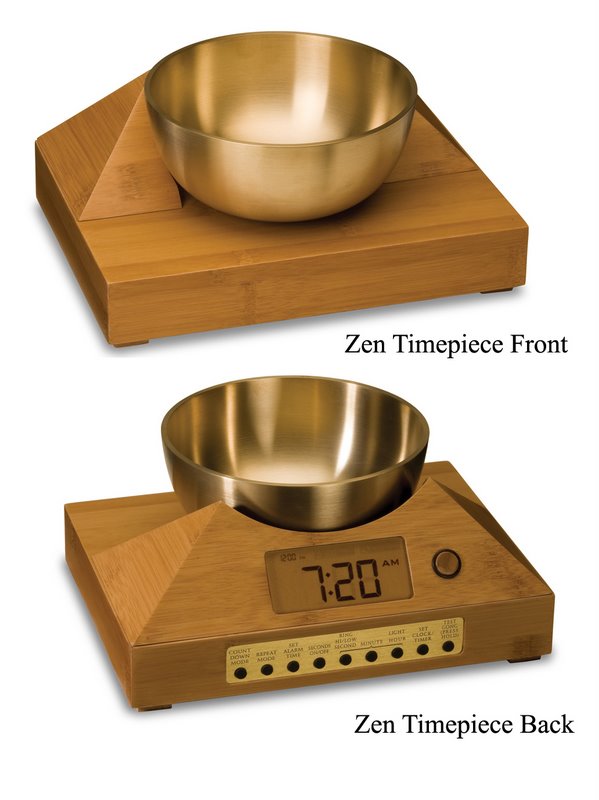 It's exquisite sounds summon your consciousness out of your meditative state with a series of subtle gongs. It serves as the perfect meditation timer. Now & Zen – The Singing Bowl Meditation Timer Store
1638 Pearl Street
Boulder, CO 80302
(800) 779-6383
orders@now-zen.com
Posted in Uncategorized
 Once you experience the Zen Timepiece's progressive tones, you'll never want to meditate any other way. This simple yet profound meditation can ease emotional or physical tension.
Based on Taoist Meditation practice, the inner smile meditation is a simple yet profound meditation that is quite natural to many people. It is centered on generating the benevolent qualities of a genuine smile that we usually offer to others. The inner smile is an opportunity to offer a smile to oneself. It can be done in a seated meditation session or in the midst of daily life. The inner smile can also be integrated into hatha yoga practice and can be particularly helpful during intense poses.
To begin, find a comfortable posture for meditation (seated on a cushion or blanket, in a chair, or against a wall). It may be helpful to set a timer for 10, 20, or 30 minutes so you can sink deeply into your meditation without wondering about the time. You may also want to gently ring a bell at the beginning and end of your meditation.
Place your hands on your knees in Jnana Mudra (index and thumb touching), with palms facing up to open your awareness or palms facing down to calm the mind. Do a body scan and relax any tension you may be holding. Let your spine rise from the root of the pelvis. Draw your chin slightly down and lengthen the back of your neck.
Meditation Practice
Begin by generating a feeling of natural happiness as if it emanates from the backs of the eyes. This may happen naturally or it may take you awhile to drop into the poetic possibility needed to allow a smile to come from the backs of your eyes. If the feeling does not come immediately, remind yourself of any experience of natural joy-for example, the face of a joyous child.
Once you generate the feeling of this smile, let it radiate down the backs of your eyes like a waterfall. Visualize this meditative stream flowing down the center of your spine, to your heart and lungs, then into your stomach and spleen (under your left lower ribs), and liver (under your right lower ribs). Let it run down through the kidneys (back ribs), the colon and intestines (belly), down into your genitals, and out into your legs and feet. You can repeat the sweep from the backs of the eyes to the feet or do one long, slow sweep. The inner smile can be its own complete meditation or it may lead you into an effortless meditative absorption.
When you are ready, bring your hands together in Anjali Mudra (Salutation Seal) and complete your meditation with a moment of gratitude, reflection, or prayer to seal the energy of your meditation into your life. Remember that you can cultivate the inner smile anytime throughout the day to fill the heart with compassion.
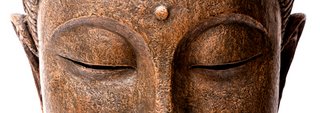 It serves as the perfect meditation timer. Use our unique “Zen Clock” which functions as a Yoga & Meditation Timer. It features a long-resonating acoustic chime that brings your meditation or yoga session to a gradual close, preserving the environment of stillness while also acting as an effective time signal. Our Yoga Timer & Clock can be programmed to chime at the end of the meditation or yoga session or periodically throughout the session as a kind of sonic yantra. The beauty and functionality of the Zen Clock/Timer makes it a meditation tool that can actually help you “make time” for meditation in your life. Bring yourself back to balance.
adapted from yogajournal.com by Shiva Rea
 It's exquisite sounds summon your consciousness out of your meditative state with a series of subtle gongs. Now & Zen – The Meditation Timer Shop
1638 Pearl Street
Boulder, CO 80302
(800) 779-6383
orders@now-zen.com
Posted in intention, Meditation Timers, Meditation Tools, mindfulness practice
 The beauty and functionality of the Zen Clock/Timer makes it a meditation tool that can actually help you "make time" for meditation in your life. Bring yourself back to balance. New research suggests that mindfulness meditation can help relieve pain and improve memory by regulating a brain wave known as the alpha rhythm, which “turns down the volume” on distractions.
In a small study, researchers found that those participants using meditation were better able to modulate the waves — when they were told where to direct their attention — after they finished an eight-week course, compared to a control group that did no meditation.
“Mindfulness meditation has been reported to enhance numerous mental abilities, including rapid memory recall,” study co-author Catherine Kerr, of the Martinos Center for Biomedical Imaging at Massachusetts General Hospital and the Osher Research Center at Harvard Medical School, said in a news release provided by Massachusetts General. “Our discovery that mindfulness meditators more quickly adjusted the brain wave that screens out distraction could explain their superior ability to rapidly remember and incorporate new facts.”
The alpha rhythm plays a role in the cells that process senses like touch, sight and sound in the brain’s cortex. It helps the brain ignore distractions, helping a person to focus while many things are going on, the study authors said.
The findings “may explain reports that mindfulness meditation decreases pain perception,” Kerr added. “Enhanced ability to turn the alpha rhythm up or down could give practitioners’ greater ability to regulate pain sensation.”
The new research may also help explain how meditation might affect basic brain function, said study co-author Stephanie Jones, of the Martinos Center.
“Given what we know about how alpha waves arise from electrical currents in sensory cortical cells, these data suggest that mindfulness meditation practitioners can use the mind to enhance regulation of currents in targeted cortical cells. The implications extend far beyond meditation and give us clues about possible ways to help people better regulate a brain rhythm that is dysregulated in attention-deficit hyperactivity disorder and other conditions,” she said in the news release.
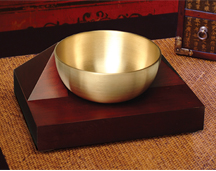 It features a long-resonating acoustic chime that brings your meditation or yoga session to a gradual close, preserving the environment of stillness while also acting as an effective time signal. The study was released online April 21 ahead of publication in the journalBrain Research Bulletin.
SOURCE: Massachusetts General Hospital, news release, April 21, 2011
 . The Zen Alarm Clock can effect your awareness in a variety of positive ways, all of which require your participation. Use our unique “Zen Clock” which functions as a Yoga & Meditation Timer. It features a long-resonating acoustic chime that brings your meditation or yoga session to a gradual close, preserving the environment of stillness while also acting as an effective time signal. Our Yoga Timer & Clock can be programmed to chime at the end of the meditation or yoga session or periodically throughout the session as a kind of sonic yantra. The beauty and functionality of the Zen Clock/Timer makes it a meditation tool that can actually help you “make time” for meditation in your life. Bring yourself back to balance.
 “Mindfulness” is the spiritual practice of being aware of your present moment. Now & Zen – The Meditation Timer Store
1638 Pearl Street
Boulder, CO 80302
(800) 779-6383
orders@now-zen.com
Posted in Bamboo Chime Clocks
 meditation prayer Virtually every culture has a tradition of blessing food, cooking and eating mindfully, and giving thanks for the gift of nourishment, Alexander says.
Intention
To create a setting for nurturing and togetherness.
Materials
Festive table decorations, favorite foods, a candle.
Steps
1. Set a specific day and time for a weekly dinner. Every member of the family, even small children, should be in charge of contributing something — even if it’s just stirring the pot or setting the table. Focus your intention as you chop, mix, and blend.
2. Before eating, light the candle, then hold hands and acknowledge the gifts in your life. Create a special family blessing — recite a favorite short poem or say something like, “We thank mother earth, the sun, and rain for producing this food, the farmers for growing and harvesting it, and the cook for preparing it.”
3. Eat with mindfulness. Encourage silence as everyone savors the taste and texture of the food. Reflect on the journey from farm to table, and how lucky you are to be eating delicious, nourishing food.
adapted from wholeliving.com, Dec. 2011
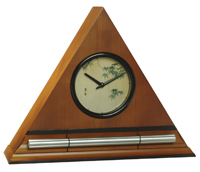 zen alarm clocks and meditation timers Now & Zen’s Alarm Clock Store
1638 Pearl Street
Boulder, CO 80302
(800) 779-6383
Posted in Bamboo Chime Clocks
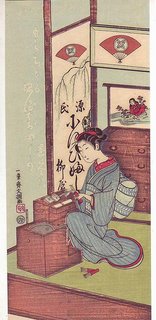 The Zen Alarm Clock transforms mornings, awakening you gradually with a series of gentle acoustic chimes Once you use a Zen Clock nothing else will do Do people choose what would make them happier? Would more money but with less sleep make you happier? A group of economists found that research participants chose what they thought would make them happier 83 percent of the time, with the majority choosing less sleep for a higher salary.
The group from Cornell University and the University of Michigan posed 13 scenarios to 2,699 people, including this question:
Say you have to decide between two new jobs. The jobs are exactly the same in almost every way, but have different work hours and pay different amounts.
Option 1: A job paying $80,000 per year. The hours for this job are reasonable, and you would be able to get about 7.5 hours of sleep on the average work night.
Option 2: A job paying $140,000 per year. However, this job requires you to go to work at unusual hours, and you would only be able to sleep around 6 hours on the average work night.
The paper, first reported by the Washington Post, studied three groups of people: 1,066 patients at a doctor’s waiting room in Denver, 1,000 adults across the country by telephone and 633 Cornell students. The American Economic Review will publish the paper.
Ori Heffetz, a Cornell economics professor who presents the paper at UCLA on Tuesday, said the most surprising finding for him was that “people’s choices seemed to coincide with their happiness predictions least frequently for what they thought were important life decisions.”
Among the respondents in Denver, 58 percent chose option one and also thought more sleep would make them happier, while 29 percent chose option two and said the higher salary would make them happier. However, 12 percent ranked option one (sleep) above option two (income) when asked what would make them happier; but they said they would most likely choose option two. Only one percent said they would choose sleep but thought they’d be happier with income.
Daniel Benjamin, economics professor at Cornell, said one of the most interesting study findings is there are systematic differences between what people think would make them happiest and what they would choose. Many researchers had believed it was obvious that people would choose what they think would make them happiest.
When asked which options they would choose, Heffetz said he would choose the higher salary because he typically needs less than six hours of sleep a night. Benjamin said it was a “tough” question, but he would choose the job that afforded more sleep.
“I don’t think I could survive on 6 hours of sleep at unusual hours,” he wrote in an email. “I need at least 8, preferably more.”
 Wake up with gradual, beautiful acoustic chimes. The Zen Alarm Clock transforms your mornings and gets you started right, with a progressive awakening Wake up refreshed, love your alarm clock, transform your mornings with The Zen Alarm Clock’s progressive awakening with gentle chimes.
The Digital Zen Clock’s long-resonating Tibetan bell-like chime makes waking up a beautiful experience – its progressive chimes begin your day with grace. When the clock’s alarm is triggered, the acoustic chime bar is struck just once … 3-1/2 minutes later it strikes again … chime strikes become more frequent over 10 minutes … eventually striking every 5 seconds until shut off. As they become more frequent, the gentle chimes will always wake you up – your body really doesn’t need to be awakened harshly, with a Zen Clock you’re awakened more gradually and thus more naturally. Unlike artificial recorded sounds coming out of a tiny speaker in a plastic box, natural acoustic sounds transform your bedroom or office environment.
adapted from abcnews.go.com by Suzanna Kim
 The Zen Alarm Clock transforms mornings, awakening you gradually with a series of gentle acoustic chimes Once you use a Zen Clock nothing else will do Now & Zen – The Soothing Alarm Clock Store
1638 Pearl Street
Boulder, CO 80302
(800) 779-6383
orders@now-zen.com
Posted in Bamboo Chime Clocks, Now & Zen Alarm Clocks, sleep, Sleep Habits
 Meditation - Utamaro Woman I have always been intrigued by the idea of meditation. I would love to be able to sit quietly, relax and let my mind wander into a trancelike rest, all at the same time.
There are reported medical benefits to regular meditation too: you can bring down your heart rate and blood pressure. Meditation has been shown to help insomniacs sleep, nervous Nellies relax and those withchronic pain breathe more easily.
Meditation sounds like a perfect dream, actually, but who has time for that? As a television producer, I would say my daily list of things to do can run longer than a pilgrimage to the Ganges. Would it be worth adding meditation to my to-do list? I needed to be convinced.
So I went to Avery Fisher Hall in Manhattan for a group meditation led by Sri Sri Ravi Shankar, a spiritual leader and founder of The Art of Living Foundation. “The Guru,” as he is called, traveled from southern India to kick off the “I Meditate NY” campaign, designed to introduce stressed-out New Yorkers to the powers of the ancient practice of meditation. Gathered in the hall normally reserved for plays and operas were nearly 2,700 people ready to follow the spiritual teachings of the master on stage.
The preparation began with ancient Sanskrit chants from the folk group Bakti and soulful vocals from the Grammy-nominated singer Chandrika Tandon. But before long The Guru took center stage, sitting in the lotus position on a regal loveseat.
With a creeping smile on his face, he began to explain the three platinum rules of meditation. The first, he said, was to say to oneself, “For the next 10 minutes, I want nothing.” Sounded simple enough, but the truth is I did want something. I was a little hungry, even though I had a pretty big cheeseburger a few hours earlier. It even had all sorts of extras on it. My mind started to wander: Why was I hungry when I just had a big meal? Maybe it wasn’t as big as I thought? Oh man, that means that cheeseburger must have clearly been full of empty calories.
But The Guru had already moved on to platinum rule number two: “For the next 10 minutes, I do nothing.” Just then, my foot started to itch. I reached down to scratch it immediately, figuring the clock hadn’t yet started.
Rule three: “For the next ten minutes, I am nothing.” Now he was on to something. I liked that idea. It made me feel as if I had permission to float away, let my spirit drift into oblivion, all the while surrounded by thousands of people.
 Meditation - Choose a Gong Meditation Timer Sounds of Silence
The group was full of Om’s and ready to sink into silence… or so we thought. Just then, The Guru reached into the pocket of his caftan for hiscellphone. The crowd burst into laughter — no doubt, this was a 21st-century guru. He promised it was only to time our imminent meditation, which he has said would last about 10 minutes.
Now we were on our way. He asked everyone to keep still and be quiet. If you didn’t think you could do so, it was now time for you to leave. He said nobody should leave in the middle of the journey, as that would not be fair to others around them. Parents with children were asked to leave now. It was time to begin.
The room fell silent, but not silent enough. There were coughs, bodily noises, feet sliding, and yes, a cell phone. I thought, it’s going to be tough to concentrate on doing nothing. The coughs seemed ceaseless. I wondered, well, we are heading into allergy season, is that why there are so many coughs? Or is this just how people always are? It isn’t often I’m in a room with 2,700 people.
But then something happened. I don’t really know what happened, because it’s as if I wasn’t there when it occurred. I mean, I was there, but I was nothing more than just there. Sitting. Breathing. Not hearing coughs. Not hearing feet shuffling. Not even hearing silence. I was awake. I was conscious. It wasn’t that hard. I was peaceful. I was meditating.
There we were. An auditorium full of silent people, together, effortless, releasing our minds from daily stress, buried in peace, meditating.
Meditation: Struggling to Do Nothing
And then it was over. The Guru woke us up — and then he gave us a jolt. He told us in his gentle meandering voice that we had been in this “amusement paradise” for 22 minutes. Not 10 minutes as he had suggested, but more than double that. The entire room gasped. We had disappeared for nearly the length of an evening news broadcast.
And, even though it felt counterintuitive to do something so seemingly solitary with so many others, it actually now made perfect sense. Later, The Guru told me, “Group meditations help in creating a positive energy in the atmosphere.” Meditation was all about vibrations, he said. Just as we “catch anger” from angry people around us, we “catch” positive energy from positive people around us. The room was surely full of positivity.
 meditation timers with gongs So there you have it. A frazzled New Yorker with a Ganges-long list of to-dos may have just peacefully and willingly made her list longer.
Use our unique “Zen Clock” which functions as a Yoga & Meditation Timer. It features a long-resonating acoustic chime that brings your meditation or yoga session to a gradual close, preserving the environment of stillness while also acting as an effective time signal. Our Yoga Timer & Clock can be programmed to chime at the end of the meditation or yoga session or periodically throughout the session as a kind of sonic yantra. The beauty and functionality of the Zen Clock/Timer makes it a meditation tool that can actually help you “make time” for meditation in your life. Bring yourself back to balance.
It’s exquisite sounds summon your consciousness out of your meditative state with a series of subtle gongs. Once you experience the Zen Timepiece’s progressive tones, you’ll never want to meditate any other way. It serves as the perfect meditation timer. Available in 5 wood styles, including bamboo.
adapted from WorldNewsReport.com by Gitka Ahuja
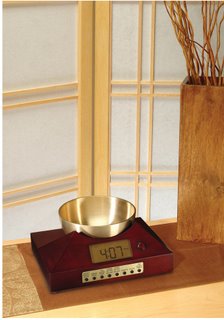 Gong Meditation Timers for Your Stillness Practice Now & Zen – The Gong Meditation Timer Store
1638 Pearl Street
Boulder, CO 80302
(800) 779-6383
Posted in Well-being, Yoga Timer, Yoga Timers by Now & Zen, Zen Alarm Clock, Zen Timepiece by Now & Zen, Zen Timers
 Wake Up Slowly and Naturally with Zen Clocks - Kitagawa Utamaro A new poll on sleep habits suggests that millions of Americans are in a bad mood, short-tempered and prone to overeat because they are tired.
The National Sleep Foundation Poll, released today, finds that people say they’re much or somewhat more likely to make mistakes, get impatient or aggravated when waiting, or get upset with their children or others when they haven’t gotten enough sleep.
One fourth said they were more likely to eat more than usual on days when they didn’t get enough sleep, with slightly more women than men reporting this was common.
The poll establishes a link between how Americans sleep and “their overall behavior, mood and performance,” said Richard Gelula, the foundation’s executive director. “It shows ‘you are how you sleep.’ And it indicates that some of the problems that we face as a society, from road rage to obesity, may be linked to lack of sleep or poor sleep.”
The foundation, an independent, nonprofit organization researches sleep problems. It has conducted a poll on sleep habits each year since 1998, part of a springtime sleep-awareness campaign tied to the return of daylight- savings time, which begins Sunday.
The poll of 1,010 adults, taken between October and early December, found that nearly a quarter felt they weren’t getting the minimum amount of sleep they need to be alert the next day. Thirty-seven percent said they are so sleepy during the day that it interferes with their activities a few days each month; 16 percent said they experience this level of fatigue at least a few days a week.
Overall, sleep habits have remained fairly steady since the poll began, but the number of people reporting they sleep less than six hours a night both on weekdays and weekends rose slightly last fall, to 15 percent and 10 percent, respectively. On average, people say they are sleeping an average of 6.9 hours on weeknights and 7.5 hours on weekends.
Adults living in the West were more likely to get eight hours or more sleep on a workday than those living in the Midwest, South and Northeast.
 Once you experience the Zen Timepiece's progressive awakening, you'll never want to wake up any other way. Those who got fewer than six hours of sleep on weekdays were twice as likely to describe themselves as stressed or sad.
And people who reported often being sleepy during the day were considerably more likely than those who were never or rarely sleepy to describe themselves as dissatisfied with life (21 percent versus 7 percent) or angry (12 percent versus 4 percent).
More than half of those surveyed said they experience symptoms of insomnia a few nights a week or more; 37 percent said they snore frequently and 1 in 10 experiences pauses in breathing while sleeping.
The luxurious awakening provided by the Zen Alarm Clock is part of the growing preference for things natural—natural foods, natural fibers, and now, natural acoustic sounds. Like organic tomatoes in your salad, the organic sounds of the Zen Alarm Clock’s sweet acoustic chimes are truly a gourmet experience.
What makes this gentle awakening experience so exquisite is the sound of the natural acoustic chime, which has been tuned to produce the same tones as the tuning forks used by musical therapists. According to the product’s inventor, Steve McIntosh, “once you experience this way of being gradually awakened with beautiful acoustic tones, no other alarm clock will ever do.”
adapted from sfgate.com by Lee Bowman, Scripps Howard News Service
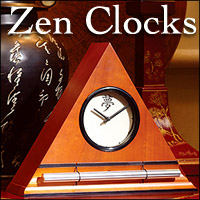 Why be Startled Awake -- Choose the Gentle Chime Alarm Clock for a Progressive Awakening Now & Zen – The Gentle Chime Alarm Clock Shop
1638 Pearl Street
Boulder, CO 80302
(800) 779-6383
Orders@now-zen.com
Posted in Bamboo Chime Clocks, Insomnia, sleep, Sleep Habits
 Once you experience the Zen Timepiece's progressive tones, you'll never want to meditate any other way. Meditation’s virtues have long been praised and, more recently, documented in studies on Buddhist monks, who devote their entire lives to the discipline. But how effective can it really be for Western meditators, who practice on average just 30-40 minutes a day while balancing an entirely different set of external responsibilities and social stresses than their more rigid Eastern counterparts?
A team of researchers from Yale, Harvard, Massachusetts General Hospital, and the Massachusetts Institute of Technology recently checked it out. Using magnetic resonance imaging (MRI), the scientists scanned the brains of 35 test participants; 20 Western-style meditators and 15 control participants who had never practiced meditation or yoga. The former group was instructed to meditate, while the latter was asked to relax and let their minds wander.
The result? Brain regions associated with attention and sensory processing were denser in meditators (up to 4 to 8 thousandths of an inch thicker) than those of the control group. Moreover, the study demonstrated that regular meditation could reduce the effects of normal cognitive aging and perhaps even memory loss. “This was the first time anyone has looked at brain structure in meditation subjects”, said lead researcher Sara Lazar, Ph.D., a psychologist at Harvard Medical School. “Consistent with the reports of meditators, who claim that meditation affects all aspects of their lives, our findings suggest that cortical plasticity (structural changes of the brain) are not just limited to the amount of time spent actually sitting and meditating.”
You don’t have to shave your head and hole yourself up in an ashram; even a half-hour of meditation delivers lasting mind-body health benefits.
 Bring yourself back to balance. Use our unique “Zen Clock” which functions as a Yoga Timer. It features a long-resonating acoustic chime that brings your meditation or yoga session to a gradual close, preserving the environment of stillness while also acting as an effective time signal. Our Yoga Timer & Clock can be programmed to chime at the end of the meditation or yoga session or periodically throughout the session as a kind of sonic yantra. The beauty and functionality of the Zen Clock/Timer makes it a meditation tool that can actually help you “make time” for meditation in your life. Bring yourself back to balance.
adapted from healinglifestyles.com by Lindsay Morris
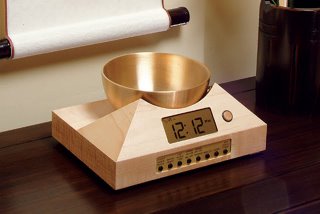 Once you experience the Zen Timepiece's progressive tones, you'll never want to meditate any other way. It serves as the perfect meditation timer. Now & Zen – The Meditation Timer Store
1638 Pearl Street
Boulder, CO 80302
(800) 779-6383
orders@now-zen.com
Posted in Meditation Timers, Meditation Tools, mindfulness practice
 Use our unique "Zen Clock" which functions as a Yoga Timer. It features a long-resonating acoustic chime that brings your meditation or yoga session to a gradual close, preserving the environment of stillness while also acting as an effective time signal. Positive brain changes take hold after just 11 hours of practicing a form of meditation, the results of a new study suggest.
The study included 45 University of Oregon students who were randomly selected to be in either a study group that did integrative body-mind training (IBMT) or a control group that did relaxation training. IBMT was adapted from traditional Chinese medicine in the 1990s.
A comparison of scans taken of the students’ brains before and after the training showed that those in the IBMT group had increased brain connectivity. The changes were strongest in connections involving the anterior cingulate, an area that plays a role in the regulation of emotions and behavior, Yi-Yuan Tang of Dalian University of Technology in China, University of Oregon psychologist Michael I. Posner, and colleagues found.
The boost in brain connectivity began after six hours of IBMT and became more apparent after 11 hours of practice, according to the report published in the Aug. 16-21 online edition of the Proceedings of the National Academy of Sciences.
The meditation-induced changes may be due to a reorganization of white-matter tracts or due to an increase of myelin that surrounds the brain connections, the study authors suggested.
“The importance of our finding relates to the ability to make structural changes in a brain network related to self-regulation. The pathway that has the largest change due to IBMT is one that previously was shown to relate to individual differences in the person’s ability to regulate conflict,” Posner said in a university news release.
SOURCE: University of Oregon, news release, Aug. 16, 2010
 The beauty and functionality of the Zen Clock/Timer makes it a meditation tool that can actually help you "make time" for meditation in your life. Although meditation can be done in almost any context, practitioners usually employ a quiet, tranquil space, a meditation cushion or bench, and some kind of timing device to time the meditation session. Ideally, the more these accoutrements can be integrated the better. Thus, it is conducive to a satisfying meditation practice to have a timer or clock that is tranquil and beautiful. Using a kitchen timer or beeper watch is less than ideal.
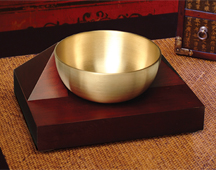 Our Yoga Timer & Clock can be programmed to chime at the end of the meditation or yoga session or periodically throughout the session as a kind of sonic yantra.
And it was with these considerations in mind that we designed our Zen Alarm Clock and practice timer. This unique “Zen Clock” features a long-resonating acoustic chime that brings the meditation session to a gradual close, preserving the environment of stillness while also acting as an effective time signal. The Zen Clock can be programmed to chime at the end of the meditation session or periodically throughout the session as a kind of sonic yantra. The beauty and functionality of the Zen Clock/Timer makes it a meditation tool that can actually help you “make time” for meditation in your life.
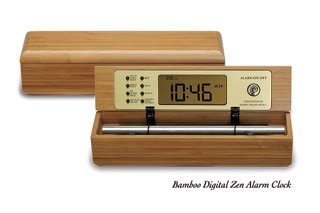 When you hear the sound of the mindfulness bell, you are invited to take a moment to breathe in and out and center yourself in the present.
Posted in Bamboo Chime Clocks
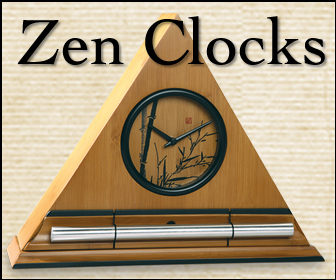 meditation timers for cultivating calm How to Cultivate Calm
It may seem counterintuitive, but one of the best things you can do in times of high stress is not much at all. Of course, what you’re thinking about during this quiet period of reflection and breathing makes a big difference. By practicing meditation and mindful breathing, you can reduce stress levels, increase productivity, and boost your mood.
Meditation doesn’t necessarily mean sitting cross-legged on a pillow or lying on the ground. In fact, you can do the following exercises indoors or outdoors, at work or in your car, with a free hour or a free minute. You don’t have to perfect them all, but experimenting with various techniques will help you find the method that works best for you.
wholeliving.com, Dec. 2011
 Carved Wooden Thai Buddha with Singing Bowl Now & Zen
1638 Pearl Street
Boulder, CO 80302
(800) 779-6383
Posted in Chime Alarm Clocks
« Previous Page — « Previous Entries
Next Entries » — Next Page »
|
|
|
|